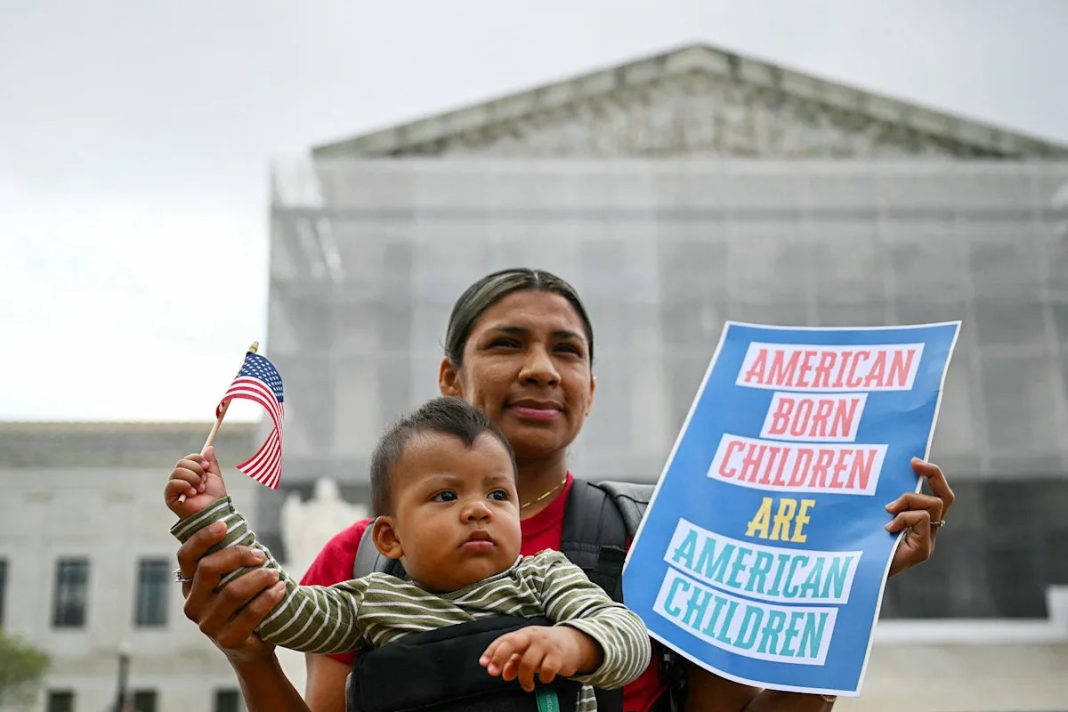Just one month ago, the Supreme Court issued a relatively narrow — but incredibly important — ruling in a series of cases challenging President Donald Trump’s executive order that purported to end birthright citizenship. The six conservative justices found that only in extremely limited circumstances can courts issue nationwide or universal injunctions — court orders that halt the application of a law or policy throughout the country. Already, several plaintiffs have returned to different lower courts, and the judges hearing their cases determined that those plaintiffs have met the Supreme Court’s new and extremely high bar to secure these injunctions once again. But these cases will inevitably return to the Supreme Court. How the court handles the cases, and whether it abides by its own ruling from just weeks ago, will be the strongest indicator yet of whether this court will check any administration action, no matter how illegal or unconstitutional.
In one of the first acts of his second term, Trump issued an executive order seeking to restrict birthright citizenship — the bedrock legal principle that anyone born in the United States is a U.S. citizen. The first sentence of the 14th Amendment states, “All persons born or naturalized in the United States, and subject to the jurisdiction thereof, are citizens of the United States and of the State wherein they reside.” For well over a century, the Supreme Court has interpreted that plain language as applying to anyone born in the U.S., regardless of the immigration status of their parents.
After the president’s order, the legal challenges followed. One of the first was filed in Seattle: a lawsuit brought by four states that was assigned to Judge John Coughenour, an appointee of President Ronald Reagan. In an initial hearing, Judge Coughenour said, “I have been on the bench for over four decades. I can’t remember another case where the question presented was as clear.” After adding that the order was “blatantly unconstitutional,” he issued a temporary ruling halting the application of the executive order. More courts followed suit, and several judges issued injunctions halting the executive order from going into effect nationwide.
In recent years, universal injunctions have become important tools for litigants against both Republican and Democratic policies. The Congressional Research Service identified 86 nationwide injunction cases during the first Trump administration, 28 from the Biden administration and 25 nationwide injunctions in just the first 100 days of the second Trump administration.
While legal scholars across the political spectrum are sometimes critical of certain uses of universal injunctions, in cases of this scope — affecting a federal policy with clear nationwide impact — this type of relief is necessary. A ruling on a state-by-state or plaintiff-by-plaintiff basis would mean everyone’s rights would depend on whether they were able to hire a lawyer, go to court and secure a ruling in their favor, and not on whether they were the victim of an illegal and unconstitutional order, even one already determined as such.
During Joe Biden’s presidency, the Supreme Court rarely batted an eye when endorsing broad relief against the administration, on issues ranging from the Biden administration’s student loan forgiveness plan to its environmental policies. The justices did not curtail the use of nationwide injunctions even when the Biden administration asked the justices to address the question of whether they were proper.
But with the change in the administration, the Supreme Court’s view appears to have changed.
In siding with the administration in the birthright citizenship case, the court addressed only the appropriateness of nationwide injunctions, while avoiding the much more substantive questions around the executive order and birthright citizenship. The court found that nationwide injunctions are only appropriate in limited circumstances: when the plaintiffs file a nationwide class action, or the lawsuit is brought by states against the federal government and those litigants cannot be afforded “complete relief” without a nationwide ruling.
Taking up the court’s invitation, the plaintiffs in several cases returned to the lower courts, where they satisfied the judges there that they could meet these new requirements. Already, three different courts, in three different jurisdictions, have followed the Supreme Court’s new guidance and issued rulings once again preventing the Trump administration from enforcing the birthright citizenship order.
Once these cases return to the Supreme Court, the justices will have two choices. They could accept that the plaintiffs followed the court’s prior ruling and finally address the legality of Trump’s executive order. Or they could kick the can down the road again, ignoring their own prior ruling and issuing new, even more inscrutable guidance that is designed for one purpose: to make nationwide injunctions impossible to secure unless and until there is no longer a Republican in the White House.
This Supreme Court is already known for discarding decades-old precedent. But disregarding its own recent ruling and rejecting the cases where the litigants and lower court judges followed the Supreme Court’s instructions would be the height of hypocrisy, difficult to stomach and impossible to justify. And it should surprise no one if the court, once again, finds a way to bat down these challenges. Such a ruling would confirm that no one can expect this court to stand up to the administration, no matter how unconstitutional its actions, even if it means the court ignores its own words when the ink is not yet dry.
This article was originally published on MSNBC.com

